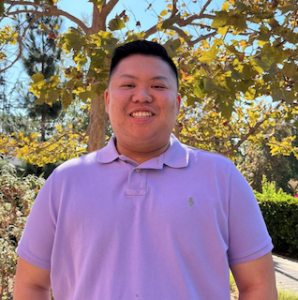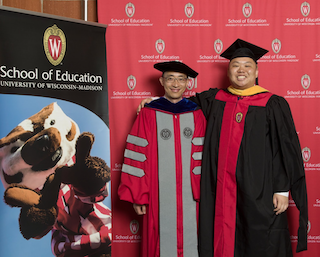UW–Madison’s Global Higher Education (GHE) Master’s Degree Program is celebrating its 10th anniversary during the current academic year.
The program, housed in the School of Education’s highly ranked Department of Educational Leadership and Policy Analysis, focuses on training future generations of professionals and scholars and is known for its family-like, collaborative learning community that utilizes a cohort model. Students follow the course sequence together, which provides a daily platform for exchanging ideas, sharing experiences, and sharing expertise regarding current and critical issues in international higher education.
As they move through the program together, students have opportunities to expand their professional networks, build lifelong friendships, and provide support to each other among cohort fellows. Students who have completed the program describe the cohort experience as one of the most valuable aspects of the GHE program, which features a good mix of students who grew up in the United States learning alongside students who are coming to Madison from abroad.
GHE also centers its efforts on connecting education with career development, including embedded internships, and on individualized mentoring and career coaching from Weijia Li, the GHE program director.
To further help people understand the Global Higher Education Master’s Degree Program, the School of Education’s communications team caught up with some alumni of the program.

Following is one such Q&A conducted with Jimfong Chu, who graduated from the program in 2022. Chu currently works at the University of California, Los Angeles (UCLA) as an exchange adviser in the Dashew Center for International Students and Scholars. Chu earned an undergraduate degree at UCLA before heading to Madison to earn a master’s.
How did you end up joining the GHE program? I was at UCLA as an undergrad, and I worked at a place called the Hammer Museum. In that museum, there were a lot of international students, and I realized through their backstories and motivations that I really wanted to work in the international field. So I started thinking about, “What can I do to work in international education, or international studies?” GHE was one of the first programs that I found through Google research, and I pretty much just went for it.
Weijia often talks about the family atmosphere of the program, and how you’re part of this global higher ed family. Is that something that resonates and feels true to you? Did you feel that during your time here? I can’t speak for my cohort, but for me personally, I would say I was kind of the outsider coming in. Everyone in my cohort, I’ll say more than half, were from Wisconsin. And the other quarter were international students. And I was the only one coming from the west coast. Really, the spring semester is when I truly felt included into this type of family, and I was lucky enough to befriend a lot of people. I still talk to a lot of them to this very day.
Professionally, I will say that Weijia is the cornerstone for this whole family-oriented atmosphere. It wouldn’t be possible without him. And to this day, I still appreciate it. Professor Li and all of the connections I made really helped me get to the career where I am now working with international students at UCLA.
I’ll also add that in addition to leading the program and advising us, Professor Li is our friend. He won’t overstep but will really help you with whatever you need help with. The family aspect of the program really focuses on how you could be a big part of the program — and how the program could be a big part to you.
 What aspects of the program did you most enjoy or find most useful during your time here? Getting a part-time job experience with International Student Services at UW–Madison. Gaining that experience was vital in showing me what I wanted to do after graduating from the program.
What aspects of the program did you most enjoy or find most useful during your time here? Getting a part-time job experience with International Student Services at UW–Madison. Gaining that experience was vital in showing me what I wanted to do after graduating from the program.
Do you feel that the program prepared you well for what you want to do next? I will say you get out of the program what you put into it. My parents, honestly, weren’t very happy that I was moving across the country to the Midwest. But moving to Madison and being in a new atmosphere and gaining new perspectives ended up being very important and has gotten me to where I am today, I needed this program and these new perspectives. I truly appreciate the program.
What kind of work are you doing today? At the Dashew Center at UCLA I advise exchange students and visitors. I work with students on J-1 visas (Note: The Exchange Visitor (J-1) program was established by the U.S. government to allow students and scholars from other countries to come to the U.S. to participate in educational and cultural programs). Pretty much every single day I get to talk to professors and students from other countries, and I’m submitting documents and answering questions they have. I really enjoy it.